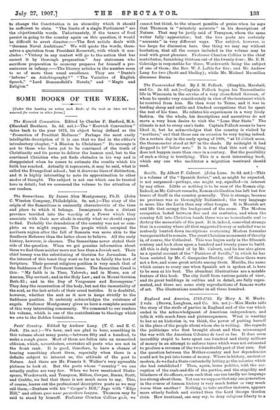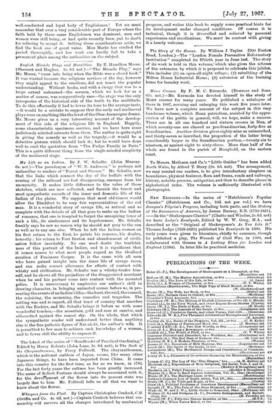England and America, 1763 - 1783. By Mary A. M. Marks. 2
vols. (Brown, Langhain, and Co. 30s. net.)—Miss Marks tells the story of the strife of parties in England and of the war which ended in the acknowledgment of American independence, and tells it with much force and picturesqueness. What is wanting to her as an historian is, we think, the power of putting herself in the place of the people about whom she is writing. She regards the politicians who first brought about and then mismanaged the war with the American Colonies de ;taut en bas. It does seem incredibly stupid to have spent one hundred and thirty millions of money in an attempt to enforce taxes which were not estimated to produce a revenue of the two-hundredth part of that sum. But the question between the Mother-country and her dependencies could not be put into terms of money. Where in history, ancient or modern, do we find a State contentedly letting go the colonies which she had established ? Then, again, home politics, with the cor- ruption of the rank-and-file of the parties, and the stupidity and blindness of its officers, seem such that one can hardly use language too strong about theta. Yet can we suppose that any one generation in the course of human history is very much better or very much worse than another? Nothing, to take another instance, appears more utterly foolish and wicked than the Lord George Gordon riots. How irrational, one may say, to deny religious liberty to a well-conducted and loyal body of Englishmen ! Yet we must remember that over a very considerable part of Europe where the faith held by these same Englishmen was dominant, men and women were still being, or had quite recently been, put to death for refusing to accept it. Setting these considerations aside, we find the book one of great value. Miss Marks has studied the period thoroughly, and her work can hardly fail to take a permanent place among the authorities on the subject.







































 Previous page
Previous page